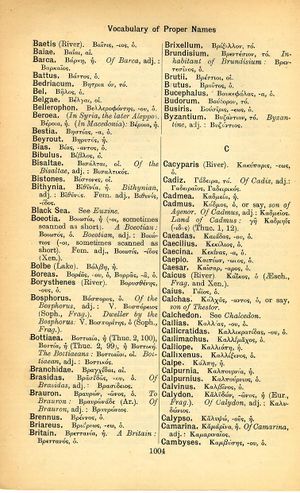Brundisium: Difference between revisions
Ἐς δὲ τὰ ἔσχατα νουσήματα αἱ ἔσχαται θεραπεῖαι ἐς ἀκριβείην, κράτισται → For extreme diseases, extreme methods of cure, as to restriction, are most suitable.
(D_2) |
(Gf-D_2) |
||
| Line 1: | Line 1: | ||
{{WoodhouseENELnames | {{WoodhouseENELnames | ||
|Text=[[File:woodhouse_1004.jpg|thumb|link= | |Text=[[File:woodhouse_1004.jpg|thumb | ||
|link={{filepath:woodhouse_1004.jpg}}]]Βρεντέσιον, τό. | |||
<b class="b2">Inhabitant of Brundisium</b>: Βρεντεσῖνος, ὁ. | <b class="b2">Inhabitant of Brundisium</b>: Βρεντεσῖνος, ὁ. | ||
| Line 8: | Line 9: | ||
}} | }} | ||
{{Gaffiot | {{Gaffiot | ||
|gf=<b>Brundĭsĭum</b>¹⁰ (<b>Brundŭsĭum</b>), ĭī, n., ville et port de Calabre (Brindes) : Cic., Cæs., Hor., etc. || <b>-ĭsīnus</b>, a, um de [[Brundisium]] : Cic. Sest. 131 || <b>-ĭsīnī</b>, m. habitants de [[Brundisium]] : Cic. Att. 4, 1, 4 || <b>Brundĭsīnum</b>, n., territoire de [[Brundisium]] : [[Varro]] R. 1, 8, 2. | |gf=<b>Brundĭsĭum</b>¹⁰ (<b>Brundŭsĭum</b>), ĭī, n., ville et port de Calabre (Brindes) : Cic., Cæs., Hor., etc. || <b>-ĭsīnus</b>, a, um de [[Brundisium]] : Cic. Sest. 131 || <b>-ĭsīnī</b>, m. habitants de [[Brundisium]] : Cic. Att. 4, 1, 4 || <b>Brundĭsīnum</b>, n., territoire de [[Brundisium]] : [[Varro]] R. 1, 8, 2.||<b>-ĭsīnus</b>, a, um de [[Brundisium]] : Cic. Sest. 131||<b>-ĭsīnī</b>, m. habitants de [[Brundisium]] : Cic. Att. 4, 1, 4||<b>Brundĭsīnum</b>, n., territoire de [[Brundisium]] : [[Varro]] R. 1, 8, 2. | ||
}} | }} | ||
Revision as of 07:28, 14 August 2017
English > Greek (Woodhouse)
Βρεντέσιον, τό.
Inhabitant of Brundisium: Βρεντεσῖνος, ὁ.
Latin > English (Lewis & Short)
Brundĭsĭum: (in many MSS., but less correctly Brundŭsĭum; cf. Suet. Caes. 34 Torrent.; Sil. 8, 576 Heins. and Drak.; Flor. 1, 20 Duker.; Luc. 2, 609 Cort.; Hor. S. 1, 5, 104 K. and H.), ii, n. (access. form Brenda, acc. to Paul. ex Fest. p. 33 Müll.: Brunda, Arn. 2, p. 50), = Βρεντέσιον or Βρεντήσιον [Βρένδον ἔλαφον, Hesych.; cf. Strab. 6, p. 432; Steph. Byz.; Isid. Orig. 15, 1, 49; from the harbor extending beyond the town like the antlers of a stag,
I an ancient town in Calabria, with a very convenient harbor, the chief naval station of the Romans in the Adriatic, and their regular point of departure for Greece, now Brindisi, Enn. ap. Gell. 6, 6, 6 (Ann. v. 478 Vahl.): redeuntes Graeciā, Brundisium navem advertimus, Gell. 16, 6, 1; Caes. B. C. 1, 25; Cic. Phil. 1, 3, 7; id. Planc. 40, 96; 41, 97; id. Att. 4, 1, 4; 5, 5, 1; 5, 8, 1; Hor. S. 1, 5, 104; id. Ep. 1, 17, 52; 1, 18, 20; Mel. 2, 4, 7; Plin. 3, 11, 16, § 99; Just. 12, 2; Luc. 2, 609 sq.; Vell. 1, 14 fin.; Flor. 1, 20.—
II Deriv. Brundĭsīnus (Brundŭs-), a, um, adj., of Brundisium, Brundisian: colonia, Cic. Sest. 63, 131; id. Att. 4, 1, 4: nuntii, id. ib. 8, 13, 1: portus, Liv. 23, 33, 4: foedus, Tac. A. 1, 10: ostrea, taken in the harbor of Brundisium, Plin. 32, 6, 21, § 61. —Subst.: Brundĭsīni, ōrum, m., the inhabitants of Brundisium, Cic. Sest. 63, 131; id. Att. 4, 1, 4; Liv. 27, 10; Gell. 16, 6, 1: in Brundisino (sc. agro), Varr. R. R. 1, 8, 2.
Latin > French (Gaffiot 2016)
Brundĭsĭum¹⁰ (Brundŭsĭum), ĭī, n., ville et port de Calabre (Brindes) : Cic., Cæs., Hor., etc. || -ĭsīnus, a, um de Brundisium : Cic. Sest. 131 || -ĭsīnī, m. habitants de Brundisium : Cic. Att. 4, 1, 4 || Brundĭsīnum, n., territoire de Brundisium : Varro R. 1, 8, 2.

